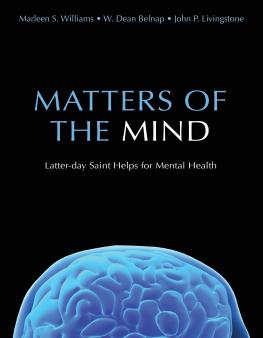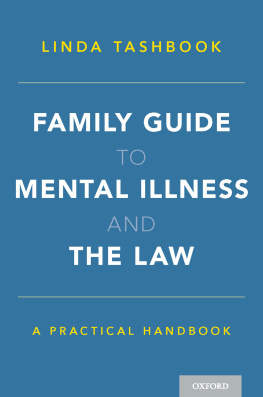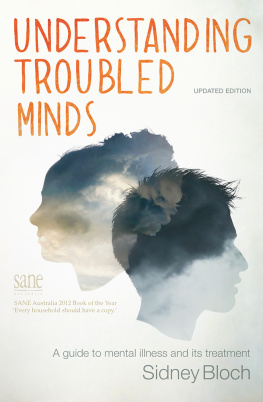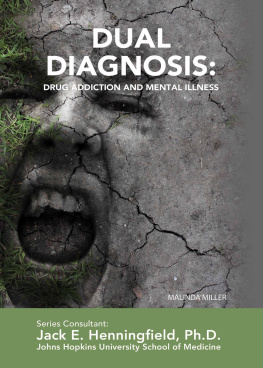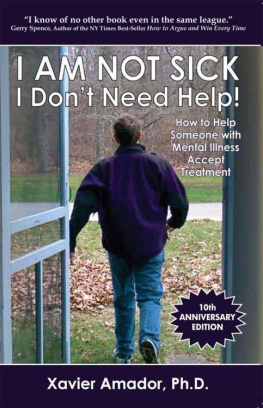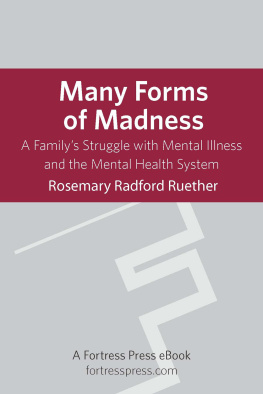Alisa Roth - Insane: America’s Criminal Treatment of Mental Illness
Here you can read online Alisa Roth - Insane: America’s Criminal Treatment of Mental Illness full text of the book (entire story) in english for free. Download pdf and epub, get meaning, cover and reviews about this ebook. year: 2018, publisher: Basic Books, genre: Detective and thriller. Description of the work, (preface) as well as reviews are available. Best literature library LitArk.com created for fans of good reading and offers a wide selection of genres:
Romance novel
Science fiction
Adventure
Detective
Science
History
Home and family
Prose
Art
Politics
Computer
Non-fiction
Religion
Business
Children
Humor
Choose a favorite category and find really read worthwhile books. Enjoy immersion in the world of imagination, feel the emotions of the characters or learn something new for yourself, make an fascinating discovery.

- Book:Insane: America’s Criminal Treatment of Mental Illness
- Author:
- Publisher:Basic Books
- Genre:
- Year:2018
- Rating:4 / 5
- Favourites:Add to favourites
- Your mark:
- 80
- 1
- 2
- 3
- 4
- 5
Insane: America’s Criminal Treatment of Mental Illness: summary, description and annotation
We offer to read an annotation, description, summary or preface (depends on what the author of the book "Insane: America’s Criminal Treatment of Mental Illness" wrote himself). If you haven't found the necessary information about the book — write in the comments, we will try to find it.
Alisa Roth: author's other books
Who wrote Insane: America’s Criminal Treatment of Mental Illness? Find out the surname, the name of the author of the book and a list of all author's works by series.
Insane: America’s Criminal Treatment of Mental Illness — read online for free the complete book (whole text) full work
Below is the text of the book, divided by pages. System saving the place of the last page read, allows you to conveniently read the book "Insane: America’s Criminal Treatment of Mental Illness" online for free, without having to search again every time where you left off. Put a bookmark, and you can go to the page where you finished reading at any time.
Font size:
Interval:
Bookmark:
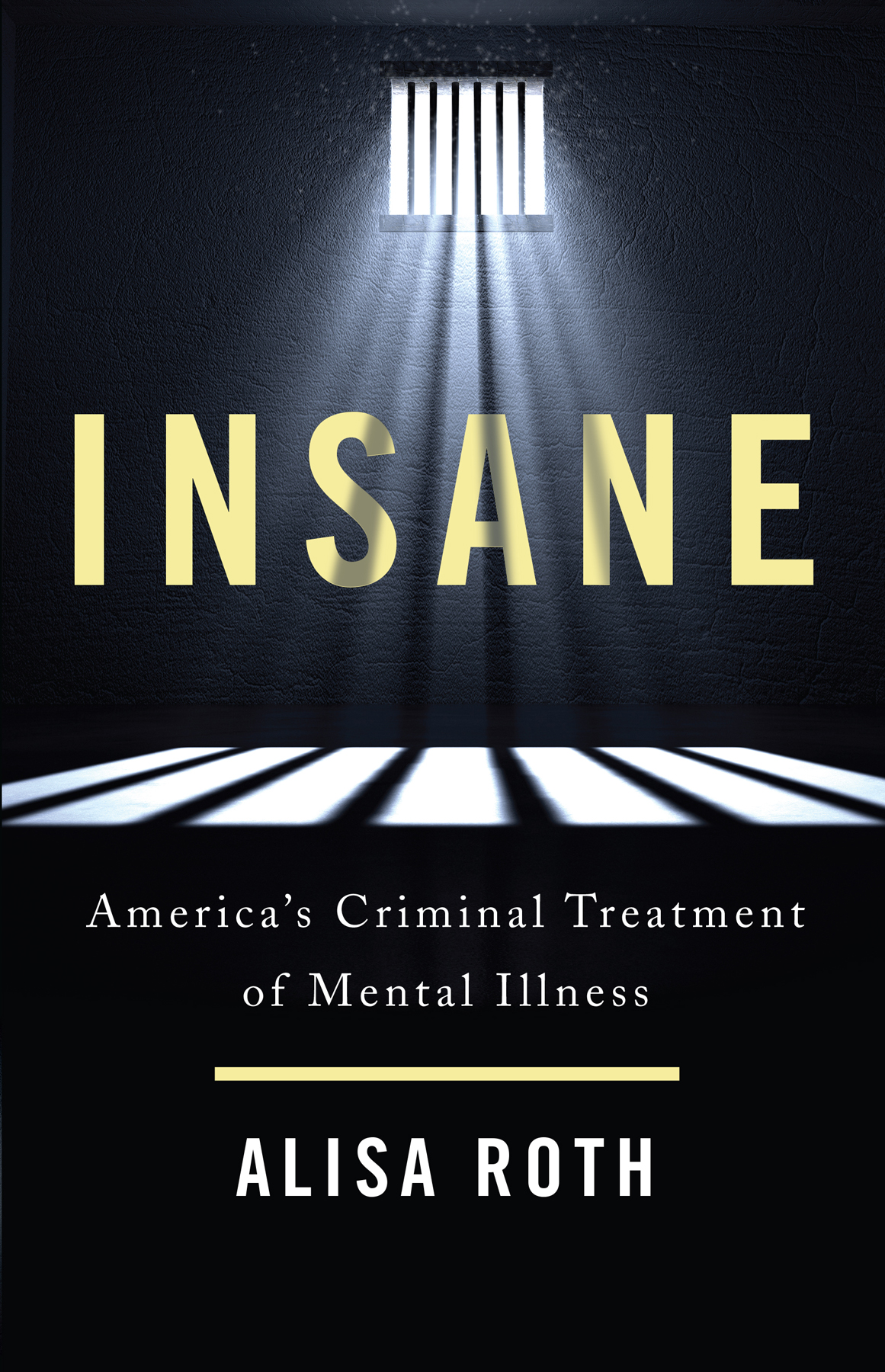
Copyright 2018 by Alisa Roth
Hachette Book Group supports the right to free expression and the value of copyright. The purpose of copyright is to encourage writers and artists to produce the creative works that enrich our culture.
The scanning, uploading, and distribution of this book without permission is a theft of the authors intellectual property. If you would like permission to use material from the book (other than for review purposes), please contact permissions@hbgusa.com. Thank you for your support of the authors rights.
Basic Books
Hachette Book Group
1290 Avenue of the Americas, New York, NY 10104
www.basicbooks.com
First Edition: April 2018
Published by Basic Books, an imprint of Perseus Books, LLC, a subsidiary of Hachette Book Group, Inc. The Basic Books name and logo is a trademark of the Hachette Book Group.
The publisher is not responsible for websites (or their content) that are not owned by the publisher.
Library of Congress Control Number: 2018933315
ISBNs: 978-0-465-09419-6 (hardcover), 978-0-465-09420-2 (ebook)
E3-20180217-JV-NF
For M, D, E, L, and H
N EAR THE BEGINNING OF K EN K ESEY S 1962 novel, One Flew Over the Cuckoos Nest, the narrator recalls seeing a public relations man give a tour of the psychiatric hospital where the story is set. Boasting of how far things have come from the old-fashioned cruelty that used to reign in such places, he tells a group of visiting teachers, What a cheery atmosphere, dont you agree? Oh when I think back on the old days, on the filth, the bad food, even, yes, brutality, oh, I realize ladies that we have come a long way.
As Keseys novel makes devastatingly clear, however, this new-and-improved institution simply offers the same old abuse in a different package. The book centers around the struggle between Randle McMurphy, a rebellious small-time criminal who feigns mental illness to avoid prison timememorably played by Jack Nicholson in the 1975 film adaptationand Nurse Ratched, the sadistic manager of the psych ward where he has been sent. McMurphy convinces the other patients to support him in an insurrection against Ratcheds control; she eventually puts an end to it by having McMurphy lobotomized.
Few other works of fiction or nonfiction have so indelibly captured the horrors of psychiatric hospitals in the mid-twentieth century, from the lack of any real effort to cure patients to outright abuse of the kind the public relations man promised had disappeared; the overmedication of the patients; the forced inactivity; the humiliating and unsanitary conditions ([one patient] stood so long in one spot the piss ate the floor and beams away under him).
But none of the rest of it has gone away, not the cruelty, the filth, the bad food, or the brutality. Nor, most importantly, has the large population of people with mental illness who are kept largely out of sight, their poor treatment invisible to most ordinary Americans.
The only real difference between Keseys time and our own is that the mistreatment of people with mental illness now happens in jails and prisons. Today, the countrys largest providers of psychiatric care are not hospitals at all, but rather the jails in Chicago, Los Angeles, and New York City. Across the country, correctional facilities are struggling with the reality that they have become the nations de facto mental health care providers, although they are hopelessly ill-equipped for the job. They are now contending with tens of thousands of people with mental illness who, by some counts, make up as much as half of their populations.
Little acknowledged in public debate, this situation is readily apparent in almost every correctional facility in the country. In Michigan roughly half of all people in county jails have a mental illness, and nearly a quarter of people in state prisons do. In 2016 the state spent nearly $4 million on psychiatric medication for state prisoners.
Although the overall number of people behind bars in the United States has decreased in recent years, the proportion of prisoners with mental illness has continued to go up. In 2010, about 30 percent of people at New Yorks Rikers Island jail had a mental illness; in 2014, the figure rose to 40 percent, and by 2017, it had gone up to 43 percent. Studies of the most frequently arrested people in New York, Los Angeles, and elsewhere have found that they are far more likely than others to have mental illness, to require antipsychotic medications while incarcerated, and to have a substance use problem.
That there are so many people with mental illness locked in our jails and prisons is but one piece of the crisis. Along with race and poverty, mental illness has become a salient feature of mass incarceration, one that must be accounted for in any discussion about criminal justice reform. Mental illness affects every aspect of the criminal justice system, from policing to the courts to prisons and beyond. Nor are the effects limited to the criminal justice system; many people with mental illness cycle back and forth between jail or prison and living in the community. The racial inequity of the criminal justice system has been widely noted: it is estimated that one out of every three African American men and one of every six Hispanic men born in 2001 will be arrested in their lifetimes.
People with mental illness are among the most disadvantaged members of our society, and when they end up in the criminal justice system, they tend to fare worse than others. People with mental illness Yet jail and prison have become, for many people, their primary means of getting mental health care. Their experiences offer an especially eye-opening view of a criminal justice system that today houses more than two million people and costs us hundreds of billions of dollars a year.
Diagnosing and treating mental illness is complicated. Unlike physical diseases like diabetes or cancer, there is no definitive test, and our assumptions about what constitutes craziness have continued to shift over the centuries. In biblical times and still today in some cultures, seeing visions or hearing voices is an indication of holiness, not madness. I spoke to the mother of a man with severe mental illness who recalled telling her son that the voice he heard couldnt be Jesus because Jesus would never say such awful things. Others might consider it a sign of mental illness to hear Jesus saying anything, good or bad. Even medical understanding of sanity is ever-changing: as recently as 1973, the Diagnostic and Statistical Manual of Mental Disordersthe preeminent guide to psychiatric diagnosis and treatmentlisted homosexuality as a disease. (It was not until 1987 that homosexuality was completely removed from the DSM.)
Beyond the difficulties of diagnosis, finding an effective way to treat serious diseases such as bipolar disorder or schizophrenia is often a matter of trial and error. Sometimes, a medication regimen stops working. Many psychotropic medications have severe side effects. The likelihood of side effects emerging increases the longer a person takes these medicines; sometimes the side effects are so bothersome that patients decide to quit taking them.
In One Flew Over the Cuckoos Nest, Kesey describes the two kinds of patients in the hospital as Acutes (because the doctors figure them still sick enough to be fixed) and Chronics (who are in for good, the staff concedes).boy whose friends called him Dino, as in dinosaur, he was diagnosed with schizophrenia when he was around fourteen. His mother, Gemma Pena, had come home from work one night to find that he had disconnected the hot-water heater, convinced that the CIA was using it to spy on him. At first she thought his behavior was simply evidence of grief over his grandmothers death a few months earlier; Rodriguez had been especially close to her. But when he continued to act strangely, saying he was hearing voices, Pena called the police and had him hospitalized against his will.
Font size:
Interval:
Bookmark:
Similar books «Insane: America’s Criminal Treatment of Mental Illness»
Look at similar books to Insane: America’s Criminal Treatment of Mental Illness. We have selected literature similar in name and meaning in the hope of providing readers with more options to find new, interesting, not yet read works.
Discussion, reviews of the book Insane: America’s Criminal Treatment of Mental Illness and just readers' own opinions. Leave your comments, write what you think about the work, its meaning or the main characters. Specify what exactly you liked and what you didn't like, and why you think so.

